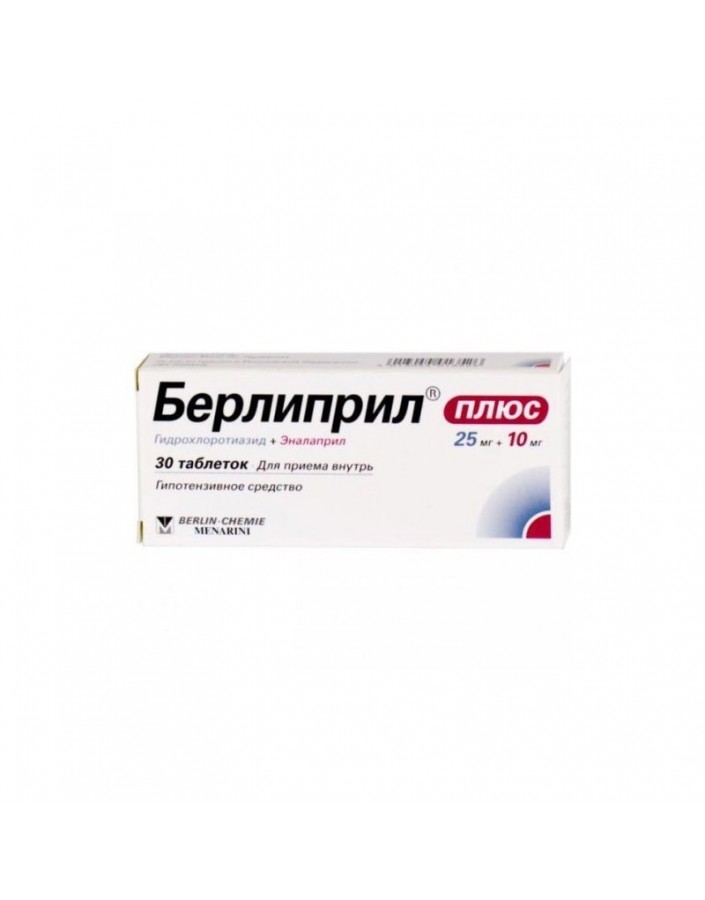



BERLIPRIL PLUS 25MG PILLS + 10MG - 30 tabs

Security policy (edit with Customer reassurance module)

Delivery policy (edit with Customer reassurance module)

Return policy (edit with Customer reassurance module)
The pills are light yellow in color, round, flat, with chamfers and a risk on one side.
1 tab.
enalapril maleate 10 mg
hydrochlorothiazide 25 mg
The combined drug, the action of which is due to the components in its composition; has a hypotensive effect.
Hydrochlorothiazide is a diuretic of moderate potency, increases urinary excretion of sodium, chlorine, water, bicarbonate. Reducing the concentration of sodium in the wall of blood vessels leads to their dilatation, reduces sensitivity to vasoconstrictor factors.
Enalapril inhibits ACE, which promotes the conversion of angiotensin I to angiotensin II, reduces the concentration of aldosterone in the blood, increases renin release, improves the functioning of the kallikrein-kinin vasodepressive system, stimulates the release of prostaglandins and endothelial venous factor, suppresses the sympathetic venous system, stimulates the release of prostaglandins and endothelial venous factor, inhibits the sympathetic venous system, stimulates the release of prostaglandins and endothelial venous factor, inhibits the sympathetic venous system, stimulates the release of prostaglandins and endothelial venous factor, inhibits the sympathetic venous system, stimulates the release of prostaglandins and endothelial venous factor.
Taken together, these effects eliminate spasm and dilate peripheral arteries, reduce OPSS, systolic and diastolic blood pressure, post-and preload on the myocardium.
Hydrochlorothiazide reduces the level of potassium in the blood, Enalapril causes its delay; with the joint use of these drugs ensures the normal maintenance of the concentration of potassium in the blood.
- arterial hypertension;
- chronic heart failure.
The drug is taken orally, regardless of the meal, 1-2 pills 1 time / (in patients with reduced glomerular filtration to 30 ml / min, individual dose selection is required, in terms of enalapril - 5-10 mg /).
Most often: dizziness, fatigue.
1-2%: muscle cramps, nausea, asthenia, orthostatic hypotension, headache, cough, impotence.
Since the cardiovascular system: fainting, lowering blood pressure, heartbeat, tachycardia, chest pain.
Allergic reactions: angioedema (face, tongue, lips, vocal cords, larynx, limbs, intestines), erythema malignant exudative (Stevens-Johnson syndrome).
From the side of the central nervous system and peripheral nervous system: dizziness, insomnia or drowsiness, paresthesia, irritability.
On the part of the respiratory system: shortness of breath.
On the part of the digestive system: dry mouth, dyspepsia (including nausea, vomiting, flatulence), diarrhea or constipation, abdominal pain, pancreatitis.
On the part of the urogenital system: impaired renal function, renal failure, decreased libido.
On the part of the skin: skin rash, itching, sweating.
Laboratory indicators: hyperglycemia, hyper- or hypokalemia, increased serum urea concentration, hypercreatininemia, hyperuricemia, increased activity of hepatic transaminases, hyperbilirubinemia, reduced Hb and hematocrit.
Other: gout, tinnitus, arthralgia, lupus-like syndrome (fever, serositis, vasculitis, myalgia / myositis, arthralgia / arthritis, positive test for antinuclear antibodies, increased ESR, eosinophilia, leukocytosis, skin rash, photosensitization).
- hypersensitivity (including to other sulfonamide derivatives);
- anuria;
- angioedema in history, associated with the intake of ACE inhibitors;
- hereditary or idiopathic angioedema;
- pregnancy;
- lactation period;
- childhood.
C caution: renal / hepatic failure, severe systemic connective tissue diseases (including SLE, scleroderma), bilateral renal artery stenosis, single kidney artery stenosis, condition after kidney transplantation, aortic stenosis, chronic heart failure, IHD, bone marrow suppression hematopoiesis, cerebrovascular diseases (including cerebrovascular insufficiency), diabetes mellitus, hyperkalemia, a diet with sodium restriction, conditions accompanied by a decrease in BCC (including iareya, vomiting), advanced age.
The use of the drug is contraindicated during pregnancy and during breastfeeding.
C caution: liver failure.
In patients with reduced glomerular filtration to 30 ml / min, an individual dose selection is required, in terms of enalapril - 5-10 mg /
C caution: renal failure, bilateral stenosis of the renal arteries, stenosis of the artery of a single kidney, the state after kidney transplantation.
With caution: advanced age.
Contraindication - children's age.
Therapy should be discontinued before examining the function of the parathyroid glands.
Undergoing dialysis. Correction of the dosage in the days when dialysis is not carried out, should be carried out depending on the level of blood pressure.
Before and during treatment, control of blood pressure, kidney function, and potassium plasma concentration is necessary.
Care must be taken when prescribing patients with reduced BCC (as a result of diuretic therapy, while limiting salt intake, hemodialysis, diarrhea, and vomiting) due to an increased risk of developing sudden hypotension after even the initial dose. Transient hypotension is not a contraindication to continue treatment with the drug after stabilization of blood pressure. In the case of recurrence of severe hypotension, reduce the dose or discontinue the drug.
In case of excessive hypotension, the patient is transferred to a horizontal position with a low head, and if necessary, a 0.9% solution of sodium chloride is injected (to increase the plasma volume).
Patients with decompensated chronic heart failure, coronary artery disease and cerebral vascular diseases should be monitored for whom a sharp decrease in blood pressure can lead to myocardial infarction or stroke, impaired renal function.
The use of dialysis membranes AN69 in combination with ACE inhibitors is not recommended.
Symptoms: excessive reduction of blood pressure up to the development of collapse, myocardial infarction, acute cerebrovascular accident or thromboembolic complications; convulsions, stupor.
Treatment: gastric lavage, ingestion of saline, in / in the introduction of plasma substitutes, angiotensin II, hemodialysis (elimination rate - 62 ml / min).
Antihypertensive effect of reducing NSAIDs, estrogen, ethanol; increase - diuretics, agents for general anesthesia, antihypertensive drugs, hemodialysis.
Immunosuppressants, Allopurinol, cytostatics increase the risk of hematotoxicity.
Enhances the effect of ethanol and slows down the elimination of lithium.
Simultaneous use with beta-blockers, slow Calcium channel blockers increases the risk of hypotension.